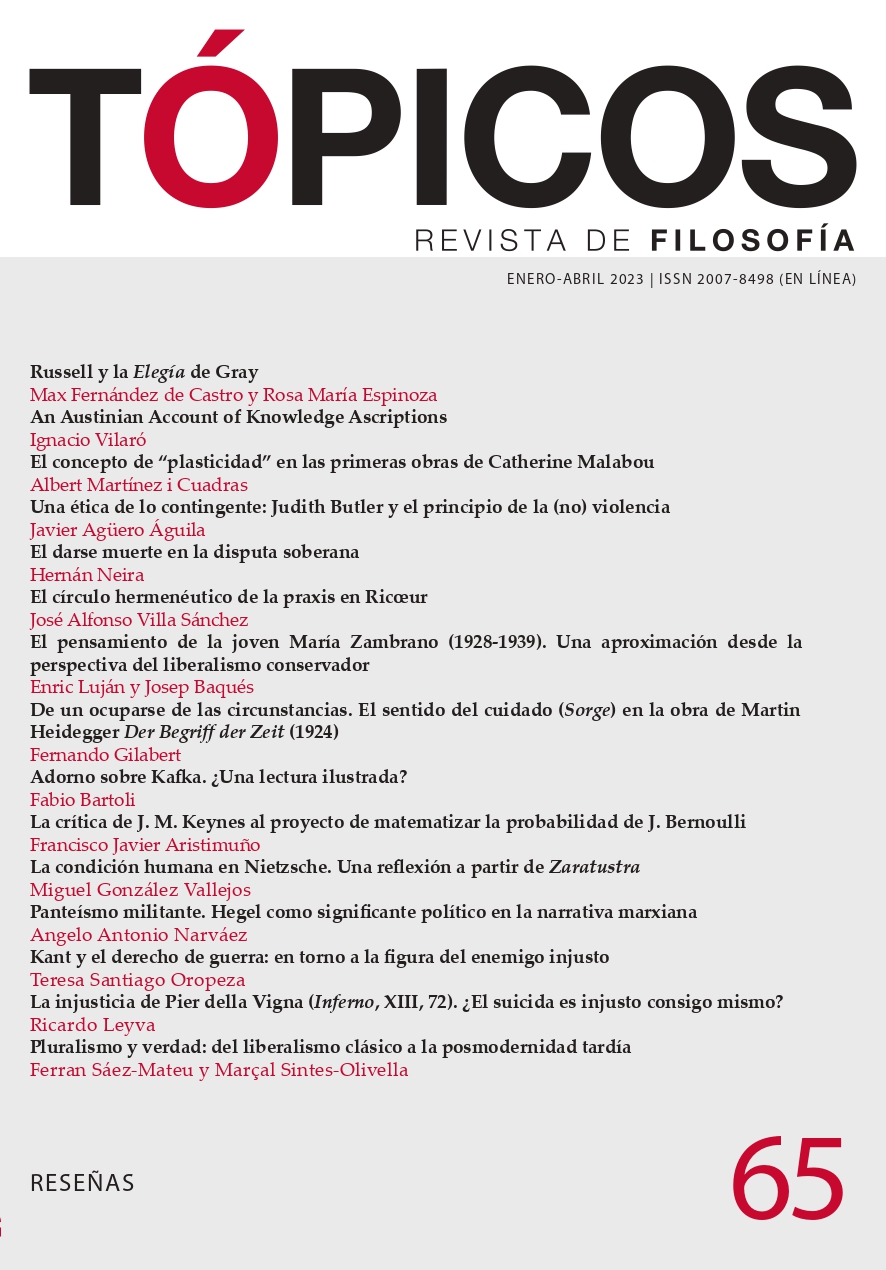The Human Condition in Nietzsche. A Reflection from Zarathustra
Published 2022-12-02
Keywords
How to Cite
Copyright (c) 2022 Tópicos, Revista de Filosofía

This work is licensed under a Creative Commons Attribution-NonCommercial-NoDerivatives 4.0 International License.
Downloads
Altmetrics
Citas
Abstract
This article reconstructs Nietzsche’s reflections on the human condition developed in his main work, Also sprach Zarathustra. The starting point of the analysis is the speech at the market, in the prologue, in which Zarathustra proclaims for the first time the advent of the Übermensch. The reconstruction of his anthropological position requires the consideration of some especially relevant passages in which the author refers to the death of God, the last man, the Übermensch, the will to power, and the eternal return. As a conclusion, I argue that, notwithstanding the presence of the concepts of perspectivism or death of the subject, the text has no deconstructive purpose, but is a reflection on the plenitude and decadence of the human condition.
References
- Biblia de Jerusalén. (2009). J. Ubieta (ed.). Desclée de Brouwer.
- Deleuze, G. (2013). Nietzsche y la filosofía. A. Tartal (trad.). Anagrama
- Fink, E. (2000). La filosofía de Nietzsche. A. Sánchez Pascual (trad.). Alianza.
- Gerhardt, V. (2012). Die Erfindung eines Weisen. Zur Einleitung in Nietzsches Zarathustra. En V. Gerhardt (ed.), Friedrich Nietzsche. Also
- sprach Zaratustra. (pp. 1-11). Akademie Verlag.
- González, A. (2019). La muerte del Dios vivo. En M. González (ed.), La muerte de Dios. Hacia una filosofía de la cruz. (pp. 171-209). RIL.
- González Vallejos, M. (2020). Filosofía de la cruz en Nietzsche. Anuario Filosófico, 53, 311-339.
- Hegel, G. W. F. (1984). Lecciones sobre filosofía de la religión. Volumen III. R. Ferrara (ed. y trad.). Alianza.
- Hegel, G. W. F. (1998). Fenomenología del espíritu. W. Roces (trad.). FCE.
- Heidegger, M. (1997) Ser y tiempo. J. E. Rivera (trad.). Editorial Universitaria.
- Heidegger, M. (2000a). Nietzsche I. J. L. Vermal (trad.). Destino.
- Heidegger, M. (2000b). Nietzsche II. J. L. Vermal (trad.). Destino.
- Janaway, C. (2009). Naturalism and Genealogy. En K. Pearson (ed.), A Companion to Nietzsche. (pp. 337-352). Wiley Blackwell.
- Kant, I. (2010). Fundamentación para una metafísica de las costumbres. R. Aramayo (trad.). Alianza.
- Lem, V. (2010). La filosofía animal de Nietzsche. Cultura, política y animalidad del ser humano. Ediciones Universidad Diego Portales.
- Meier, H. (2017). Was ist Nietzsches Zarathustra? Eine philosophische Auseinandersetzung. C. H. Beck.
- Nehamas, A. (2002), Nietzsche, la vida como literatura. R. J. García (trad.). FCE.
- Nietzsche, F. (2008). Fragmentos póstumos. Volumen II. (1875-1882). D. Sánchez Meca (ed.). J. Aspiunza y M. Barrios Casares (trads.). Tecnos.
- Nietzsche, F. (2009). Digitale Kritische Gesamtausgabe. Werke und Briefe. G. Colli, M. Montinari y P. D’Iorio (eds.). Nietzsche Source. URL: http://www.nietzschesource.org/.
- Nietzsche, F. (2010a). Fragmentos póstumos. Volumen I. (1869-1874). D. Sánchez Meca (ed.). L. E. de Santiago Guervós (trad.). Tecnos.
- Nietzsche, F. (2010b). Fragmentos póstumos. Volumen III. (1882-1885). D. Sánchez Meca (ed.). D. Sánchez Meca y J. Conill (trads.). Tecnos.
- Nietzsche, F. (2010c). Obras completas. Volumen I. Escritos de juventud. D. Sánchez Meca (ed.). J. Bautista Llinares Chover, D. Sánchez Meca y L. E. de Santiago Guervós (trads.). Tecnos.
- Nietzsche, F. (2013). Obras completas. Volumen II. Escritos filológicos. D. Sánchez Meca (ed.). M. Barrios Casares, A. Martín Navarro, D. Sánchez Meca, L. E. de Santiago Guervós y J. L. Vermal Beretta (trads.). Tecnos
- Nietzsche, F. (2014). Obras completas. Volumen III. Obras de madurez. I. D. Sánchez Meca (ed.). J. Aspiunza, M. Parmeggiani, D. Sánchez Meca y J. L. Vermal (trads.). Tecnos
- Nietzsche, F. (2016a). Así habló Zaratustra. A. Sánchez Pascual (trad.). Alianza.
- Nietzsche, F. (2016b). El nacimiento de la tragedia, A. Sánchez Pascual (trad.). Alianza
- Nietzsche, F. (2016c). Fragmentos póstumos. Volumen IV. (1885-1889). D. Sánchez Meca (ed.). J. L. Vermal Beretta y J. Bautista Llinares Chover (trads.). Tecnos.
- Nietzsche, F. (2016d). Obras completas. Volumen IV. Escritos de madurez. II. Complementos a la edición. D. Sánchez Meca (ed.). J. Aspiunza, M. Barrios Casares, K. Lavernia Biescas, J. Bautista Llinares Chover y A. Martín Navarro (trads.). Tecnos.
- Penzo, G. (2011). Übermensch. En H. Ottmann (ed.), Nietzsche-Handbuch. Leben – Werk – Wirkung. (pp. 342-345). Metzler.
- Pieper, A. (2012). Zarathustra als Verkünder des Übermenschen und als Fürsprecher des Kreises. En V. Gerhardt (ed.), Friedrich Nietzsche. Also sprach Zaratustra. (pp. 69-91). Akademie Verlag.
- Pippin, R. (2010). Introductions to Nietzsche. Cambridge University Press.
- Potestà, A. (2019). Pensar el arte. Un recorrido histórico por las ideas estéticas. Ediciones Universidad Católica de Chile.
- Platón. (2015). Gorgias. J. Echenique (trad.). Editorial Universitaria.
- Richardson, J. (2009). Nietzsche on Time and Becoming. En K. Pearson (ed.), A Companion to Nietzsche. (pp. 208-229). Wiley Blackwell.
- Safranski, R. (2000). Nietzsche. Biographie seines Denkens. Carl Hanser Verlag.
- Salaquarda, J. (2012). Die Grundconception des Zarathustra. En V. Gerhardt (ed.), Friedrich Nietzsche. Also sprach Zaratustra. (pp. 51-68). Akademie Verlag.
- Schacht, R. (2009). Nietzsche and Philosophical Anthropology. En K. Pearson (ed.), A Companion to Nietzsche. (pp. 115-132). Wiley
- Blackwell.
- Simon, J. (2012). Ein Text wie Nietzsches Zarathustra. En V. Gerhardt (ed.), Friedrich Nietzsche. Also sprach Zaratustra. (pp. 169-192). Akademie Verlag.
- Vattimo, G. (2012). Introducción a Nietzsche. J. Binaghi (trad.). RBA Libros.
- Zittel, C. (2011). Perspektivismus. En H. Ottmann (ed.), Nietzsche-Handbuch. Leben – Werk – Wirkung. (pp. 299-301). Metzler.





